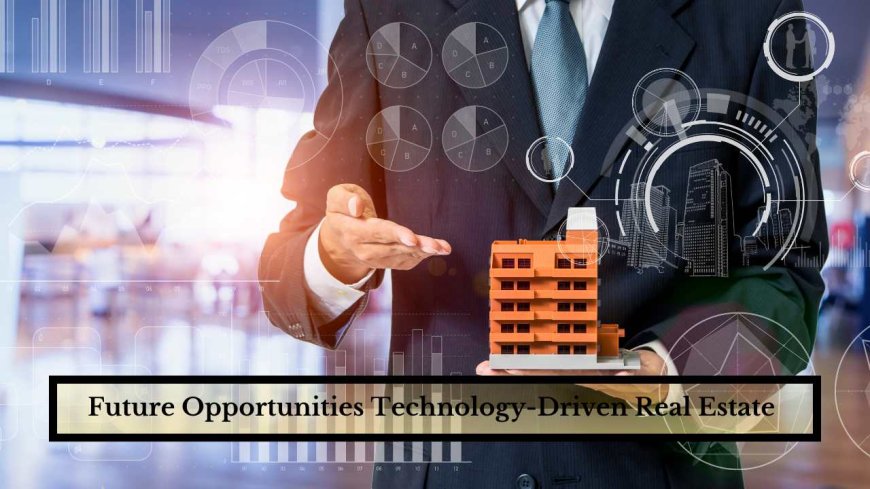Future Opportunities Technology-Driven Real Estate
The Worldwide real estate industry is predicted to reach USD 5.85 trillion by 2030, growing at a 5.2% CAGR between 2022 and 2030. Smart cities, set up with IoT devices, are emerging as a focal point in urban development.

Rapid economic growth in developing countries such as India, China, and several African countries has raised incomes and boosted the real estate business. Technology is fundamentally reshaping the real estate landscape, driving unprecedented change across all facets of the industry. From property development and management to investment and sales, technology is enabling more efficient, transparent, and personalized experiences.
Smart cities, set up with IoT devices, are emerging as a focal point in urban development. The use of IoT in real estate enables the development of smart buildings that provide increased energy efficiency, security, and tenant comfort. Smart sensors and devices provide real-time monitoring and management of building systems, resulting in cost savings and increased sustainability. The global smart building industry is projected to reach $127.09 billion by 2027.
The Impact of Technology on Real Estate
The integration of technology in real estate, often referred to as PropTech, is transforming how properties are bought, sold, managed, and lived in. Key impacts of technology on the real estate sector include:
- Increased Efficiency: Automation and data analytics streamline processes, reducing time and costs associated with property transactions, management, and development.
- Enhanced Transparency: Blockchain and digital platforms improve transparency in property transactions, reducing fraud and increasing trust among stakeholders.
- Improved Decision-Making: Advanced data analytics and AI provide valuable insights, enabling more informed decision-making in property investments, development, and management.
- Personalized Experiences: Virtual reality and smart home technologies offer personalized and immersive experiences for buyers, tenants, and property owners.
- Sustainability: Smart building technologies and energy management systems enhance sustainability, reducing the environmental impact of real estate operations.
Key Technology-Driven Trends in Real Estate for 2024
1. Artificial Intelligence and Machine Learning
AI and machine learning are at the forefront of the technological transformation in real estate. Key applications include:
- Predictive Analytics: AI-driven predictive analytics help forecast market trends, property values, and rental demand, enabling more strategic investment and development decisions.
- Automated Valuation Models (AVMs): AVMs use algorithms and data to provide accurate property valuations quickly, streamlining the appraisal process for lenders and buyers.
- Chatbots and Virtual Assistants: AI-powered chatbots and virtual assistants enhance customer service by providing instant responses to inquiries, scheduling property tours, and guiding users through the buying or renting process.
- Personalized Marketing: Machine learning algorithms analyze user behavior and preferences to deliver personalized property recommendations and targeted marketing campaigns.
2. Blockchain and Smart Contracts
Blockchain technology is revolutionizing property transactions and ownership through enhanced security, transparency, and efficiency. Key aspects of blockchain in real estate include:
- Secure Transactions: Blockchain provides a secure and tamper-proof ledger for recording property transactions, reducing the risk of fraud and ensuring the authenticity of ownership records.
- Smart Contracts: These self-executing contracts automate and enforce the terms of property agreements, such as lease agreements and sales contracts, reducing the need for intermediaries and speeding up the process.
- Tokenization of Real Estate: Blockchain enables the fractional ownership of properties through tokenization, allowing investors to buy and trade shares in real estate assets, increasing liquidity and accessibility.
- Decentralized Marketplaces: Blockchain-based platforms are creating decentralized real estate marketplaces, offering more transparent and efficient ways to buy, sell, and lease properties.
3. Virtual and Augmented Reality
Virtual reality (VR) and augmented reality (AR) are transforming how properties are marketed, viewed, and experienced. Key applications include:
- Virtual Property Tours: VR allows potential buyers and tenants to take immersive, 360-degree tours of properties from anywhere in the world, enhancing the property viewing experience.
- Augmented Reality Staging: AR enables the virtual staging of properties, allowing users to visualize how furniture and decor would look in a space, enhancing their ability to imagine living or working there.
- Design and Planning: VR and AR tools assist architects and developers in visualizing and planning building designs, layouts, and renovations, improving accuracy and collaboration.
- Remote Collaboration: VR platforms facilitate remote collaboration among stakeholders, such as architects, developers, and clients, enabling them to explore and discuss projects in a virtual environment.
4. Smart Homes and IoT
The Internet of Things (IoT) and smart home technologies are enhancing the functionality, efficiency, and convenience of residential and commercial properties. Key trends include:
- Smart Appliances and Systems: Smart thermostats, lighting, security systems, and appliances provide increased control and automation, enhancing energy efficiency and convenience for occupants.
- Building Management Systems (BMS): IoT-enabled BMS optimize the operation and maintenance of building systems, such as HVAC, lighting, and security, improving energy efficiency and reducing operational costs.
- Health and Wellness: Smart home technologies monitor and enhance indoor air quality, lighting, and acoustics, promoting occupant health and well-being.
- Connectivity and Integration: The integration of IoT devices and systems enables seamless communication and coordination, creating more cohesive and responsive smart buildings.
5. Big Data and Data Analytics
The use of big data and advanced analytics is transforming how real estate professionals make decisions and understand market dynamics. Key applications include:
- Market Analysis: Big data analytics provide insights into market trends, property values, and investment opportunities, helping investors and developers make informed decisions.
- Customer Insights: Analyzing customer data and behavior helps real estate companies understand buyer and tenant preferences, enabling more targeted marketing and service offerings.
- Operational Efficiency: Data analytics optimize property management operations, such as maintenance scheduling, energy usage, and tenant services, reducing costs and improving efficiency.
- Risk Management: Predictive analytics assess and mitigate risks associated with property investments, development projects, and market fluctuations.
6. Drones and Aerial Technology
Drones and aerial technology are being increasingly utilized in real estate for various purposes. Key applications include:
- Property Surveys and Inspections: Drones provide high-resolution aerial imagery and 3D mapping for property surveys, inspections, and assessments, improving accuracy and efficiency.
- Marketing and Visual Content: Aerial footage captured by drones enhances property marketing materials, providing unique and captivating perspectives for promotional videos and listings.
- Construction Monitoring: Drones enable real-time monitoring of construction sites, enhancing project management, safety, and progress tracking.
- Environmental and Site Analysis: Drones assist in environmental and site analysis by capturing data on topography, vegetation, and land use, aiding in planning and development decisions.
7. Sustainable and Green Technologies
Sustainability is a growing focus in the real estate sector, driven by technology and innovation. Key trends in sustainable real estate technology include:
- Energy Management Systems: Smart energy management systems optimize energy consumption, integrating renewable energy sources and reducing carbon footprints.
- Green Building Materials: Advanced materials and construction techniques enhance the sustainability and energy efficiency of buildings, reducing environmental impact.
- Water Conservation Technologies: Smart water management systems monitor and optimize water usage, supporting conservation and sustainability efforts.
- Environmental Monitoring: IoT sensors and data analytics monitor environmental conditions, such as air quality and temperature, enabling better management of indoor environments and resource use.
Future Opportunities in Technology-driven Real Estate
1. PropTech Startups and Investment
The rise of PropTech startups is driving innovation and competition in the real estate sector. Key opportunities for investment and growth include:
- Innovative Business Models: Startups are developing new business models and platforms that disrupt traditional real estate processes, such as digital marketplaces, property management software, and shared economy solutions.
- Technology Integration: Investing in technologies that enhance real estate operations, such as AI, IoT, and blockchain, offers significant potential for improving efficiency and customer experiences.
- Global Expansion: PropTech companies are expanding globally, offering opportunities to enter new markets and adapt technologies to different regions and regulatory environments.
- Collaborative Ecosystems: Partnerships between PropTech startups, traditional real estate companies, and technology providers are fostering collaborative ecosystems that drive innovation and growth.
2. Digital Transformation in Real Estate
Digital transformation is reshaping the real estate industry, offering opportunities for enhanced operations, customer experiences, and business models. Key areas of focus include:
- Digital Platforms and Marketplaces: Developing and leveraging digital platforms and marketplaces streamline property transactions, leasing, and management, providing greater convenience and accessibility for users.
- Virtual and Augmented Reality: Continued advancements in VR and AR technologies will further enhance property marketing, design, and collaboration, creating more immersive and interactive experiences.
- Smart Buildings and Cities: The development of smart buildings and cities integrates advanced technologies and data analytics to create more sustainable, efficient, and connected urban environments.
- Data-Driven Decision Making: Leveraging big data and analytics enables real estate professionals to make more informed decisions, optimize operations, and understand market trends and customer preferences.
3. Cybersecurity and Data Privacy
As technology integration in real estate increases, so do the challenges of cybersecurity and data privacy. Key considerations and opportunities include:
- Data Protection: Ensuring the security and privacy of sensitive data, such as personal information and financial transactions, is critical in maintaining trust and compliance with regulations.
- Cybersecurity Solutions: Investing in advanced cybersecurity solutions and protocols protects against cyber threats and vulnerabilities, safeguarding real estate operations and customer data.
- Regulatory Compliance: Adhering to data protection regulations, such as GDPR and CCPA, requires ongoing vigilance and adaptation to evolving legal requirements.
- User Awareness and Education: Educating users and stakeholders about cybersecurity best practices and risks enhances their ability to protect themselves and their data in a tech-driven real estate environment.
Conclusion
The integration of technology in real estate is driving transformative changes and opening new opportunities for innovation and growth. As we move through 2024, the adoption of AI, blockchain, VR, IoT, and other advanced technologies will continue to shape the future of real estate, enhancing efficiency, transparency, and customer experiences. By staying attuned to these trends and embracing technology-driven solutions, industry professionals and stakeholders can capitalize on the dynamic and evolving landscape of the real estate sector.

 LD Web Desk
LD Web Desk 